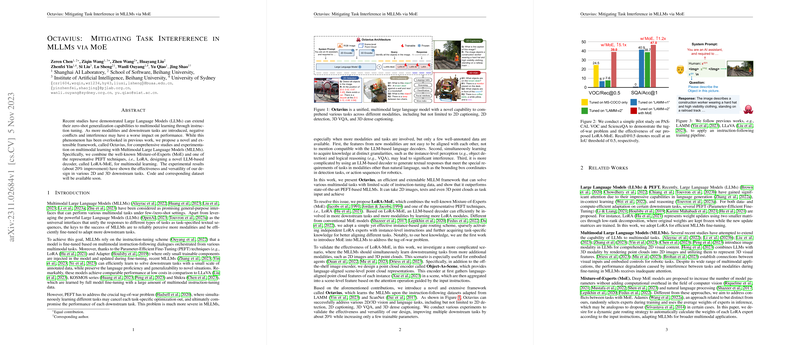Overview of "Octavius: Mitigating Task Interference in MLLMs via LoRA-MoE"
The paper presents "Octavius," a novel framework designed to address and mitigate task interference within Multimodal LLMs (MLLMs). This interference presents a significant challenge, particularly when integrating numerous modalities and downstream tasks, prompting the need for advanced strategies to optimize model performance across these varied tasks.
Key Contributions
- LoRA-MoE Framework: Central to this paper is the integration of Mixture-of-Experts (MoE) with Parameter-Efficient Fine-Tuning (PEFT) techniques, specifically LoRA. The paper introduces a new decoder, dubbed LoRA-MoE, which serves as an innovative approach to mitigating interference between tasks in MLLMs. The incorporation of MoE allows for the dynamic and efficient allocation of resources, potentially enhancing performance across both 2D and 3D modalities.
- Task-Specific Learning Paths: Through its LoRA-MoE architecture, Octavius provides specialized learning paths for different tasks and modalities. This leads to a significant reduction of the tug-of-war problem ordinarily encountered in PEFT applications, especially in scenarios involving multi-task and multi-modal learning.
- Instance-Based Gate Routing: Octavius employs an instance-based gate routing strategy. This routing decision is based on the input instructions, allowing for sparse activation of LoRA experts and better alignment of task-specific knowledge.
Experimental Results
The paper reports substantial improvements—approximately 20%—in performance across various downstream tasks by employing the LoRA-MoE strategy. These tasks include 2D captioning and detection as well as 3D Visual Question Answering (VQA) and dense captioning. The improved results underscore the effectiveness of integrating the MoE model with MLLMs to address the significant interference challenges, allowing for a more harmonious performance across diverse tasks.
Theoretical and Practical Implications
Theoretically, Octavius advances the understanding of MoE models within the context of multi-modal machine learning. By demonstrating an effective method of integrating MoE with PEFT, the framework addresses the core issue of task interference, which has been previously overlooked in prior research on MLLMs. Practically, Octavius has implications for the development and adaptation of AI models that need to perform under conditions where multiple modal inputs and diverse tasks are significant, such as in the deployment of embodied AI agents.
Future Developments
Moving forward, there are numerous avenues for further exploration. The integration of MoE into MLLMs opens the door for more nuanced exploration of specific expert gating mechanisms to improve efficiency further. Furthermore, application in real-world scenarios poses exciting possibilities, especially as models scale to incorporate more varied tasks and modalities. Additionally, the efficacy of Octavius in environments with larger-scale variability and less structured data offers a worthy subject for future paper.
In conclusion, Octavius introduces a promising approach to address task interference in MLLMs, offering both practical solutions and theoretical insights that could drive future explorations and applications in multimodal AI systems.
